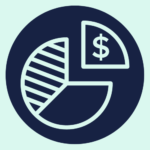How do you obtain that promotion to the role you’ve always wanted?
Work hard.
But how do you build wealth and financial stability beyond your working years?
Get your money working hard for you!
How to get your money working hard for you?
Invest.
Jump straight to…

Investment Definition
New to investing?
It may seem overwhelming, but it’s an essential step in saving for your financial goals in a way that can cover your unique financial situation. It allows you to get your money working for you and to grow your wealth too.
So, what is an investment?
It’s an asset which is bought with the intention of earning income in the future. Great investments allow you to do this without the ongoing input of your time.
Keep on reading to find out all the different investment options you may be able to access to turn your well-earned money into a wise investment.
How Do Investments Work?
Have you ever thought of going to networking events to expand your connections, or hiring a busines coach to enhance your knowledge and skills in your craft?
That’s a form of investment because the expected result is that you will be increasing the value of your skills and relationships.
Similar to investing in yourself, in order to make money work for you, you need to purchase (invest it in) assets that are of value and can generate income.
You are investing when you purchase things like bonds, shares or real estate with the goal of turning a profit or raising its value.
But compared to saving, which is a risk-free way to save money for the future, investing carries some risk.
Here’s why:
- An investment might not produce any revenue or grow in value over time. It’s possible, for instance, that a project you invest in won’t succeed.
- Some assets referred to as depreciating assets, like a computer or printer used for business purposes, depreciate over time.
It is, therefore, essential to be wise and prudent when it comes to making financial decisions by seeking investment advice from credible, experienced and licensed financial planner or financial adviser.
You’re already on the right track to becoming a better investor by trying to learn how to invest through this article!
What are the Different Types of Investments?
Imagine this:
During your working years you hold two buckets – one for your work income and one for your savings. You fill your savings bucket from the work income bucket. You take out money from either bucket (depending on the kind of expenses you have to cover). The same pattern keeps repeating as long as you keep working.

But the big question for many in the workforce is this: how long do you intend to keep working so your two buckets continue to be filled?
Eventually, you might want to stop working.
When you do stop working, where will you get the funds to fill your buckets?
You have to start by preparing the savings bucket and knowing the different types of investment options you can use to increase the balance of your savings bucket. Here are the different types of investment options we have available in Australia.

1
Growth Investments
Long-term investors who can and are willing to withstand market ups and downs engage in growth investments. This investment revolves around growing the value of an investor’s capital or the amount of money they originally invest.

2
Shares
When you purchase shares, also known as equities or stocks, in Australian or foreign companies, you essentially own a portion of that company and become a shareholder. Shares can contribute to the uptick in value of your initial investment.
Dividends, which are essentially a portion of a company’s profit distributed to its shareholders, are another source of income that may be received if you own shares. Your investment worth increases if the share price of the company rises. However, the value of your investment will decrease if the share price falls.
If you handle the shares yourself, you will have to decide when to buy and sell shares because as equities, shares are among the riskiest investment categories even though at times they can produce larger returns than other assets.

3
Property
Homes or other property prices can increase significantly over a medium to long term period, making them a form of growth investment. Just like stocks, real estate is vulnerable to loss and can decrease in value. You can invest by purchasing a property directly or through a property investment fund.

4
Defensive Investments
The goal of defensive investing is to regularly produce income rather than to focus on capital growth. This category includes cash (high-interest savings accounts) and fixed-interest assets (term deposits, government bonds, corporate bonds), which are typically used to diversify a portfolio (collection of financial investments) and satisfy short-term financial objectives (typically up to two years).

Defensive investments are considered lower risk than growth investments and tend to be favoured by those who are nearing retirement or are retired because they:
- aim to provide income
- protect the capital invested

5
Cash
Term deposits, high interest savings accounts, and regular bank accounts are all examples of cash investments. Of all the investment types, they frequently have the lowest prospective returns.
Even though cash is the least risky investment type, there’s a chance that over time, even if the dollar amount in your account remains the same, the value of your money could fall. When there is inflation (rapid rise in prices of goods and services), your purchasing power may be reduced.
Although these kinds of investment have no potential for capital growth, they can:
- provide consistent income
- protect wealth
- lower risk in a portfolio of investments.

6
Bonds or Fixed Interest
One of the most popular fixed interest investments is a bond. This is money that governments or companies borrow from investors and pay back at a set interest rate. Similar to cash, bonds can be sold relatively fast, but there is a chance of suffering capital losses.
Bonds are considered as defensive investment option because:
- They often offer smaller potential returns.
- Have lower levels of risk than shares or property.
Want to know more about investment “buckets” and which investments you can access to grow your wealth the smarter way?
Learn how to choose the best possible investment options that match your financial goals and situation by consulting with our finance experts.
Speak with a Finance Expert Today on Ways to Start Investing!

I want to see all my options with the help of a Finance Expert
Call your Money BuddyHow Do Beginners Learn to Invest?
Best Investments for Beginners
Remember this:
By investing, you move money from your work income bucket and savings bucket into additional buckets such as shares, real estate, bonds, etc.

Say you are ready to put your well-earned money to work in building your wealth and securing your financial stability.
But where to begin?
Check these out…
Investment Options for Beginners
- High-yield Savings Account
Setting aside money in a High-yield Savings Account is one of the simplest ways to increase your money’s return over what you’re getting in a conventional savings or transaction account.

- Certificates of Deposit (CDs)
This financial product, purchased through a federally insured bank, increases the interest rate on your savings. Certificates of Deposit can cover up to $250,000 per depositor, per ownership category, and are applicable for six months to one year, and some even up to five years.
Although these are quite safe as guaranteed by Authorised Deposit-taking Institution (ADI) in Australia, you cannot access your money before the CD matures without paying a penalty.

- Superannuation
Superannuation, also known as “super“, is a portion of your income that is set aside, typically by your employer, for you to live on after you retire from work. It is a retirement fund that is invested and earns interest.
For all working Australians earning more than $450 a month, making contributions to your super fund is compulsory and is created by deposit deductions of the worker and the employer’s regular contributions. Your employer is required to pay a minimum amount of your regular income towards super, based on the current super guarantee rate.
Once invested, your super balance is expected to progressively increase in value over the years.
If you’re wondering:
Can I get my super early?
Typically, you cannot access your super until you retire or reach a particular age. There are strict laws on when you can access your super fund early.

- Index Fund
As a type of mutual or exchange-traded fund, an Index Fund is a portfolio of stocks or bonds that is created to closely imitate or mirror an index of the financial markets’ performance.
An index is a financial yardstick used by investors to evaluate how well or poorly assets perform in the market.
Instead of utilising a professional portfolio management system, this passive approach to investing tends to carry a lower expense ratio while still buying a chunk of the market in a single transaction.
Your money is invested into securities (bonds, stocks, shares, etc.) within the aligned index to mirror the overall index performance and deliver similar returns. As a result, index funds can be excellent long-term investments.

- Exchange Traded Fund (ETF)
An Exchange Traded Fund is a managed fund that can be bought and sold on an exchange, such as the Australian Stock Exchange (ASX). It often follows a certain asset or market index as a passive investment option rather than attempting to outperform it. As a result, the value of your investment in an ETF will fluctuate along with the index it tracks.

Checklist: What to Do Before You Invest
Careful planning is essential to successful investing.
Do you already have a roadmap that will enable you to achieve your financial objectives effectively?
Here are guideposts to help you in your journey to investing:
- Financial review: Assess your finances by listing down your assets and debts to help you see what savings you can invest. Adding your income and expenses to the list can also aid in monitoring money that goes in and out to know how much money you can use to invest.
Assets may include:
- home
- savings
- super
- other investments
- Goal setting: Knowing your goals will help you create a stable plan. Decide what you want to accomplish in the short and long term through investing and saving.
Divide your goals into time frames to help you pick the right investment to reach each of them:
- short term (0 to 2 years)
- medium term (3 to 5 years)
- long term (5 years or more)
- Risk tolerance: Recognise your personal level of risk tolerance.
The probability that you will lose some or all of your investment capital is known as investment risk. This may be the result of your investment losing value or underperforming your expectations.
Investment risks apply to all assets. Hence, knowing your risk tolerance will help you choose which investments are best suited to you.
- Investor type: You must choose whether you want to be an active or passive investor.
An active investor could select individual investments or mutual funds that seek to outperform the market.
On the other hand, a passive investor often holds assets like diversified mutual funds or ETFs with low costs. According to studies, passive investing can outperform active investing over the long term.
- Investment management: You could either manage your own investments or do so through a financial advisor (or robo-advisor). Although you may incur less in fees if you do it yourself, having an advisor can be beneficial for a large number of reason, particular so for beginner investors.
- Taxes: Consider how much tax you will pay on the interest, dividends, and capital gains if you own investments in a single or joint account. By holding investments in tax-efficient accounts, like a super fund, you may be able to minimise the tax you’ll pay on any gains.
What if you could launch your investment journey with the guidance of an experienced finance expert instead of taking the all too common ‘hit-and-hope’ approach?
Many people may be unaware of this…but just like you, 41% of Aussies intend to get financial advice rather than going it alone, according to an Australian Securities and Investments Commission (ASIC) report.
Learn how to choose the best possible investment options that match your financial goals and situation by consulting with qualified finance experts like a financial adviser.
Find the right Financial Adviser for you with the help of My Money Sorted
When you book a call with My Money Sorted, you’ll:
✓ get a better understanding of your money matters
✓ have an idea of the experts you can call on to help you reach your goals
✓ be matched with the right financial adviser who can help simplify your family’s journey to financial wellness
My Money Sorted is your stress-free pathway to getting ahead with your money. Here’s what your journey will look like:
Step 1: Start off with a quick money matters session with My Money Sorted
Step 2: Get matched with a licensed Financial Adviser that’s right for your money situation
Step 3: Take the first step towards your money goals with a clear and sound roadmap prepared by an experienced Financial Adviser
It’s that easy!






